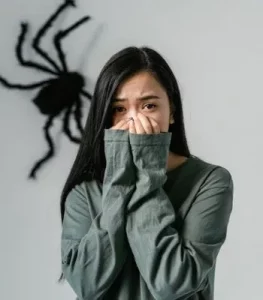Fully Details about Phobia. Types, Symptoms, and Treatment?
What is Phobia?
A phobia may be a strong and incapacitating fear of a certain object, location, scenario, emotion, or animal.
Phobias stand out quite worries. They manifest when an individual feels an excessive or unwarranted dread of a situation or object.
If a phobia becomes severe, an individual’s life may become centered on avoiding the source of their anxiety. it’s going to cause a great deal of sadness and hinder their daily activities.
Phobias and psychological state
Many folks are terrified of certain circumstances or objects. this is often very normal. A fear becomes a phobia if:
- The worry outweighs the danger and lasts for more than six months.
- It features a significant impact on how you spend your days.
When should I ask for help to treat a phobia?
It might be difficult to know when to get help for a phobia. Remember that phobias are a part of an Anxiety disorder. If you’ve got any of the following symptoms, it’s going to be time to get professional treatment for your fear:
- Avoiding the trigger item, scenario, location, or activity affects your lifestyle or causes you significant distress.
- You can’t do the activities you sometimes like because of it.
- It causes intense and overwhelming anxiety, dread, or panic.
- You recognize that your fear is out of proportion to the threat.
- The phobia has been in you for a minimum of six months.
- It keeps you from getting looked after for other health conditions, like a dread of calling or visiting a doctor.
Types of phobias
Phobias can develop in reaction to any drug or situation. Certain people may suffer from many phobias. they’re roughly divided into two categories:
- Specific phobias
- Complex phobias
Specific phobias
These are phobias related to a specific circumstance or item, like flying or spiders. They often develop throughout adolescence or infancy. they’ll become less intense for some people as they age.
Specific phobias that are very frequent include:
- A dislike towards animals. for instance, dogs, insects, snakes, and rodents.
- Anxiety over the environment. like heights, water, inclement weather, the nights, or diseases
- Fears were restrained. Elevators, aero planes, dental appointments, and tunnels are just some examples.
- Body-related fears, like those associated with childbirth, blood, vomiting, injections, choking, or medical procedures.
- Sexual aversion. like sexual behavior or a distaste for nudity
- A wide selection of phobias, including those related to specific foods, items, and even fictional characters in costume.
Your fear, on the opposite hand, maybe a unique experience. There are more phobias besides those mentioned above.
Complex phobias
Complex phobias often have a more disruptive or overwhelming impact on your life than specific phobias. They normally appear once you reach maturity.
Two of the most common complex phobias are as follows:
- Social phobia.
- Agoraphobia.
What is social phobia?
If you’ve got social anxiety, you’ll be terrified in social situations. You’ll frequently make an effort to avoid them. you would possibly worry about it before, during, and after an event. it’s also known as social anxiety disorder or social anxiety.
However, social anxiety might utterly paralyze you. you’ll find it extremely difficult to complete routine chores such as:
- talking in groups.
- starting conversations.
- public speaking.
- speaking on the phone.
- meeting new people.
- speaking to authority figures.
- eating and drinking ahead of others.
- regular trips out, to the shops for instance.
- going to figure.
You may be concerned about some social situations because you believe others will judge you negatively. Perhaps you’re concerned that anything you say or do will enrage someone else. you’ll also be anxious that others may detect your worry.
Social phobia can have a significant impact on your daily life. it’d be:
- impact your sense of worth and self-confidence.
- make you are feeling alone.
- make building and maintaining connections exceedingly challenging.
- hinder your ability to perform daily activities like shopping or work.
What is Agoraphobia?
Despite popular belief, agoraphobia is harder than this. It’s a fear of being in places or situations that you feel anxious about.
Agoraphobia may be a dread of specific settings or situations:
- that might be difficult to escape.
- that might be awkward to escape from.
- Consequently, if you experience a scare, you would possibly not be able to receive assistance.
Anxiety is sort of likely to be prevalent in your daily life. you would possibly also make an effort to avoid them.
Some examples include:
- being outside alone
- being in open spaces
- being in a crowd of people
- traveling by car, bus, or plane
- being in enclosed spaces, like a lift or in a shop.
Symptoms of phobias
Physical symptoms of phobias you may encounter the following bodily symptoms:
- feeling unsteady, dizzy, lightheaded, or faint
- feeling as if you are choking
- a pounding heart, palpitations, or accelerated pulse
- chest pain or tightness within the chest
- sweating
- hot or cold flushes
- a feeling of suffocation or lack of breath
- nausea, vomiting, or diarrhea
- numbness or tingling sensations
- trembling or shaking.
Psychological symptoms of phobias
The psychological symptoms can vary. Some experiences may include:
- fear of fainting
- fear of losing control
- fear of dying
- feeling out of touch with reality or detached from your body – referred to as dissociation.
If your symptoms are strong, you’ll experience a panic attack. Visit our pages on anxiety and panic attacks for more information.
This level of dread may appear to be quite unpleasant and terrible. it’d cause feelings like:
- Stress.
- A decline on top of things.
- Being overwhelmed.
- Embarrassment.
- Anxiety.
- Depression.
Causes of phobia
Phobias don’t appear to be caused by a single factor. a spread of circumstances might lead to the development of a phobia. However, there’s rarely a clear explanation of why it begins.
Examples of causes of phobias
- Learned responses from youth. Your early environment may need to influence the development of your fear. you’ll have concerned or nervous parents or guardians, for instance . this might influence how you deal with anxiety in the future. you’ll develop fears comparable to those of your parents or elder siblings. If they need a strong reaction to something they dread, you would possibly begin to feel the same way they do.
- You may have worried or anxious parents or guardians, for instance. This might affect how you cater to anxiety in the future. you’ll acquire anxieties similar to your parents’ or older siblings.
- If they need a strong reaction to something they are afraid of, you’ll begin to feel the same way. Factors of genetic origin. Certain people, consistent with studies, are more likely than others to develop phobias.
- Experiencing long-term stress. Stress can cause anxiety and depression symptoms. it’s going to make it more difficult for you to deal with certain situations. this might raise your anxiety or concern about revisiting such events. This might become a phobia over time.
- Past incidents or traumas. Some occurrences may still have an impact on how you feel about them. for instance, if you were a small child and flew through a lot of turbulence, you would possibly become scared of flying. If you were bitten by a dog a few years ago, you’ll acquire a fear of dogs.
- Reactions and responses to panic or fear. In response to anything, a robust reaction or panic attack may ensue. you’ll feel embarrassed as a result of this. particularly if others near you react angrily to what you say. you’ll be much more concerned about the possibility of this happening again.
Treatment for phobias
Cognitive behavioral therapy
Cognitive behavioral therapy (CBT) aims to:
- Identify the links between behavior, feelings, and thoughts.
- Aid in the development of useful abilities to manage any patterns that are troubling you.
Exposure therapy
Exposure therapy is gradually exposing you to the object or scenario you are scared of. this is often done in a safe and controlled manner.
For example, if you’ve got a phobia of dentists and are undergoing exposure therapy, you might:
- read about the dentist
- look at pictures of a dentist’s chair
- sit in the waiting room
- talk to the dentist
- finally, sit in the dentist’s chair.
It is vital that you fully understand the process of treatment and feel at ease with your therapist. Each step is going to be determined in advance. This method must be appropriately handled to avoid causing discomfort and stress.
After some exposure, you’ll begin to feel like you have more control over your fear. desensitization technique is achievable even with the use of virtual reality (VR) equipment. However, the majority of this type of therapy is still in the experimental stage.
Hypnotherapy for phobias
Hypnosis is employed in hypnotherapy to try to change habits or heal specific conditions.
You must be in a deep state of relaxation to access:
- subconscious beliefs
- thoughts
- memories.
Don’t forget to consult your psychiatrist as soon as possible to help you with your treatment.
The End












